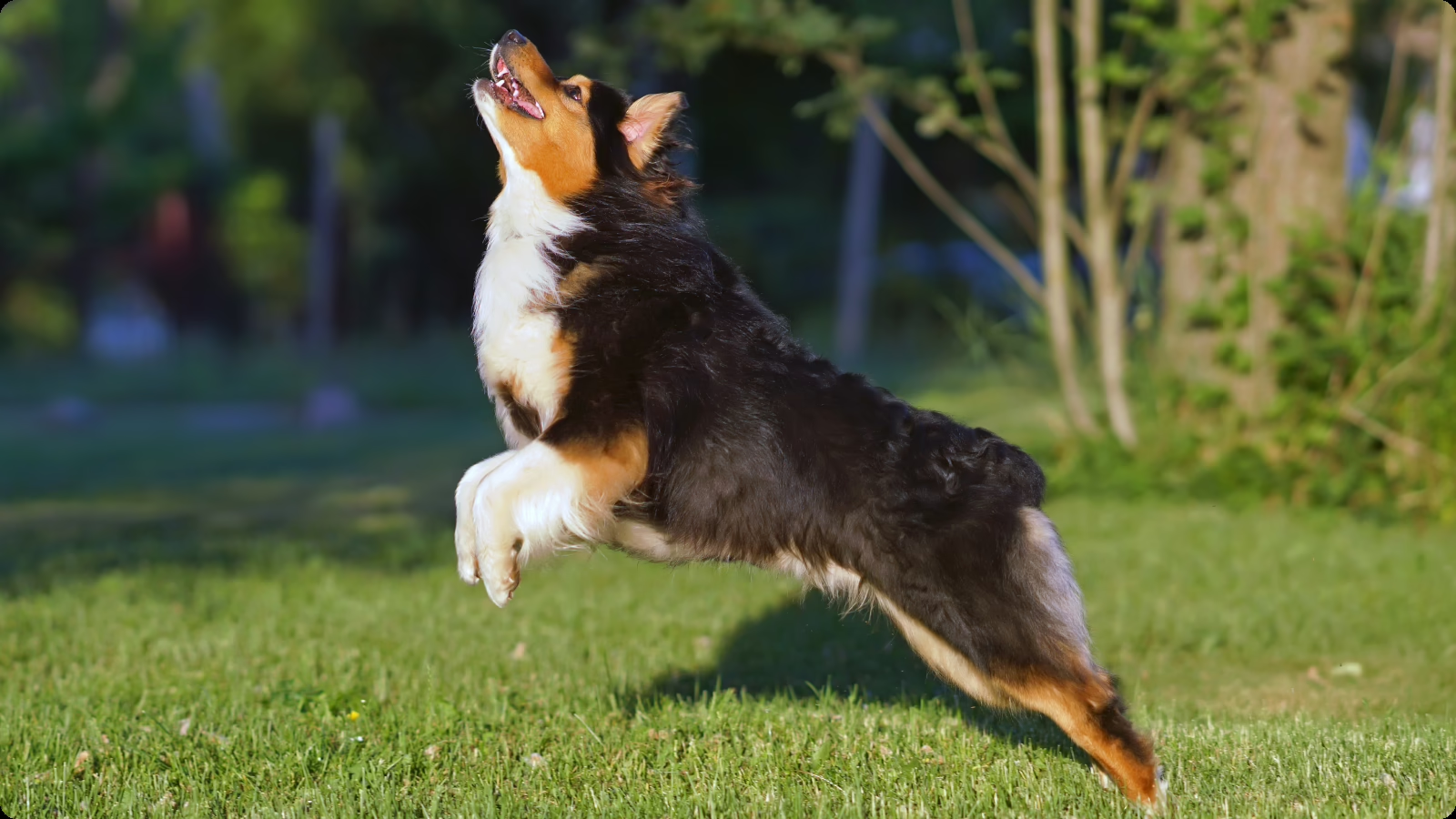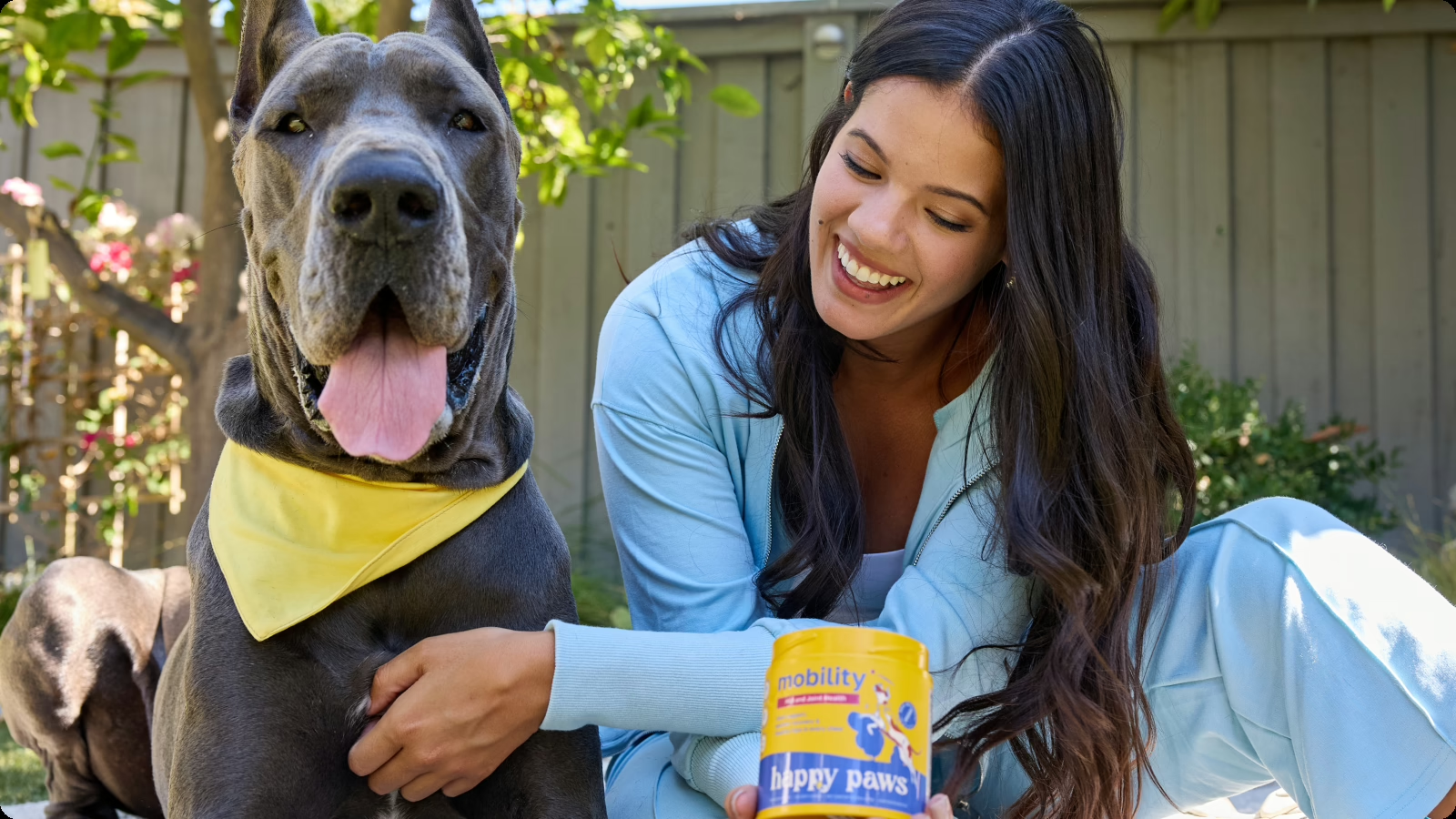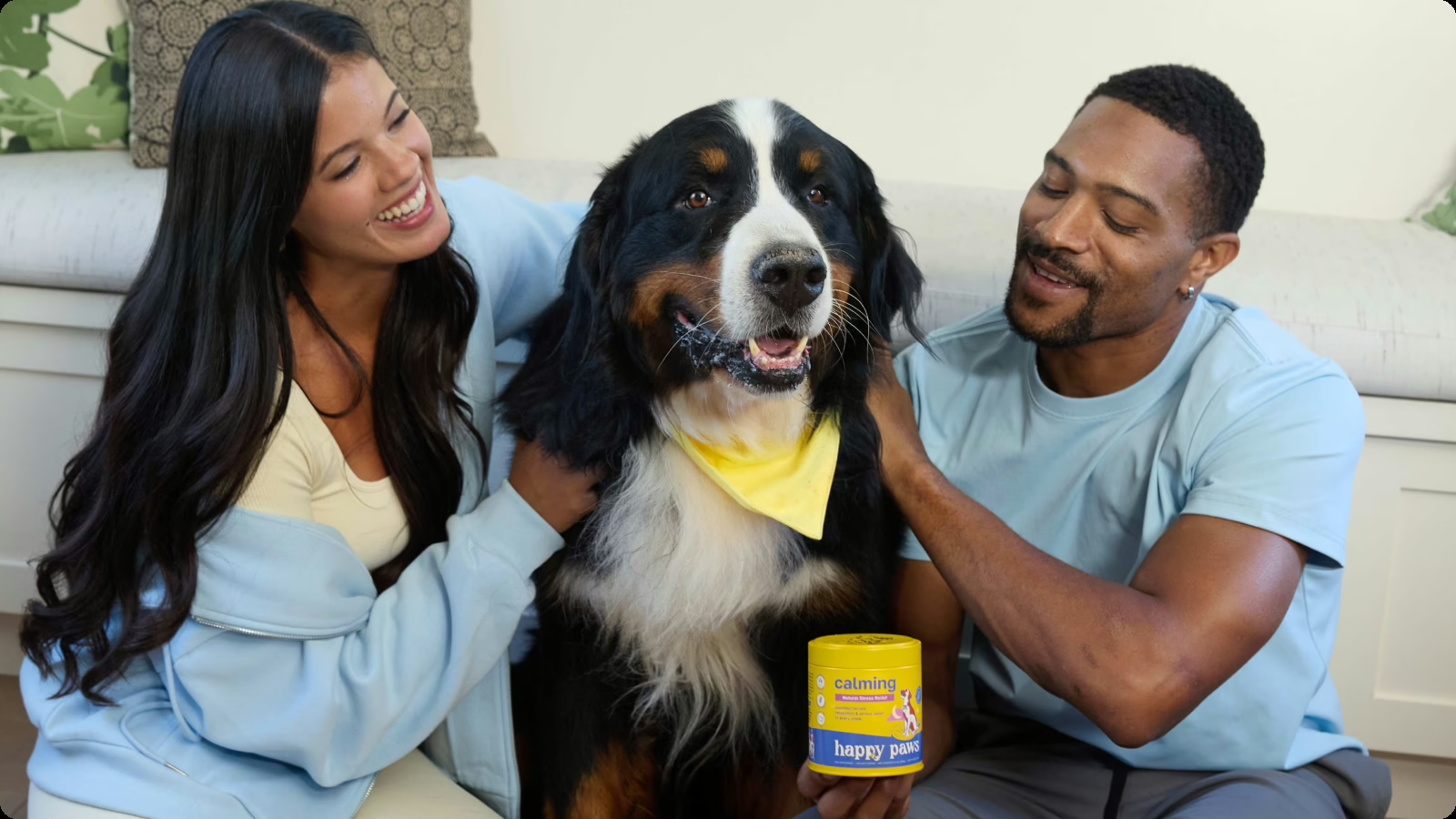The Italian Bodyguard
A stoic, yet loyal love bug, Cane Corso (pronounced “Connie Corso”) is a benevolent behemoth. With their muscular stature and large frame, Cani Corsi (plural for Cane Corso) look more formidable than other breeds, but their gentle souls and quietly goofy personalities make for quite the canine conundrum.
The Cane Corso’s fierce loyalty and protective instincts help them carve out a spot in families of any size. Initially bred for guarding farms, hunting Italian boars, and keeping livestock under their watch, the Cane Corso has taken on a new role in the home—one that highlights their affectionate side and, at times, their protective instincts. These dogs are as strong and regal as they look. And with the right training, the Cane Corso can be molded into an irreplaceable canine companion.
At Happy Paws, we’re dedicated to helping all dogs, from purebreds to certified mutts, live their happiest, healthiest lives. We’ve designed our dog supplements to target a range of trouble spots in your dog’s health—many of which include common issues for a Cane Corso.
In this article, we’ll explore the history of this Italian bodyguard, provide some information and tips on how to care for them, and help you decide which supplements are best for your family’s gentle guardian, the Cane Corso.
Quick Facts
Origin: Italy
Size: Extra large
Breed Group: Working
Lifespan: 9–12 years
Coat: Short hair—minimal grooming recommended
Temperament: Loyal, protective, and sometimes aloof.
Exercise Needs: The Cane Corso doesn’t just have brawns; they’ve also got a smart, quick-as-a-whip brain nestled between those floppy ears. And they need daily exercise to keep both in check. Because of their high demand for structured daily exercise, Cani Corsi might not be suited for new dog owners. These dogs tend to work best with owners who know how to manage their strong, towering frame and inquisitive personalities.
Training: All dogs need some degree of training, and Cani Corsi are no different. But unlike other dogs, Cani Corsi gravitate toward structured training. They enjoy having a task and look forward to positive reinforcement. Like all young dogs, Cane Corso puppies dogs need training pretty early on. Daily training will provide your gentle giant with guidelines on how to behave around guests, children, elderly folks, and other pets, and early training will help them adjust to their quickly growing size.
Dog Health: Like other extra-large breeds, Cani Corsi have unique health challenges. Common problems this breed faces include hip dysplasia, digestive issues, and cardiovascular complications. We’ll discuss how to address each below.
Happy Paws for Cani Corsi
Enrich your Cane Corso health with high-quality, tasty supplements like these!
| Type of Happy Paws Supplement | Best for … |
| Cognitive Dog Chews | Promoting brain health & mental clarity |
| Digestive Health Dog Chews | Supporting healthy digestion & a strong gut flora. |
| 10-in-1 Multivitamin Dog Chews | Giving your pupper a daily dose of essential vitamins, minerals & other nutrients. |
| Hip & Joint Dog Chews | Soothing common symptoms of joint dysplasia & inflammation. |
| Probiotic Dog Chews | Restoring the healthy bacteria in your dog’s digestive system. |
In-Depth Look at These Popular Supplements
The Cane Corso works tirelessly to please and protect their family. So, it’s always best to order dog supplements that work hard for them. Return the love and spoil your Cane Corso daily with healthy treats that actually taste like treats. Our high-quality, tail-waggin’ dog supplements use an array of all-natural, organic ingredients to enrich your dog’s physical and mental health, while satisfying their taste buds.
Here are a few dog supplements to help you care for your dog.
Cognitive Dog Chews: Cani Corsi are an intelligent breed that requires a structured routine and confident leadership from their owners. This breed is intelligent and intuitive, always watching with a curious gaze. Help feed their powerful minds with our Cognitive Dog Chews. These vegan, chicken-flavored chews use an array of vitamins, minerals, and other nutrients to promote optimal brain health and fight against cognitive decline—a natural part of aging in dogs.
Digestive Health Dog Chews: Our Digestive Health Dog Chews use powerful, all-natural probiotics and enzymes to enrich your dog’s gut health and strengthen their digestive system. These healthy, tasty dog treats offer a delicious pumpkin flavor that spoils your pet’s palate while fortifying their gut flora.
10-in-1 Multivitamin Dog Chews: Our 10-in-1 Multivitamin Dog Chews use multiple essential nutrients to strengthen your dog’s daily health and give them a well-rounded supplement. One vegan, lamb-flavored dog treat introduces ten critical nutrients to keep your dog healthy, happy, and active.
Hip & Joint Dog Chews: Help soothe your dog’s symptoms of joint dysplasia with our Hip & Joint Dog Chews! Packed with a blend of joint-friendly ingredients, this dog supplement helps reduce inflammation and support joint health, thanks to compounds like glucosamine, chondroitin, and hyaluronic acid.
Probiotic Dog Chews: Packed with powerful antioxidants, probiotics, and superfoods, our Probiotic Dog Chews help strengthen your dog’s digestive system, while supporting their gut and bowel health.
Common Cane Corso Health Concerns
Like other extra large dog breeds, Cani Corsi are often prone to common health issues like these:
Elbow & Hip Dysplasia: According to the American Kennel Club (AKC), many medium-sized to extra-large dog breeds are susceptible to elbow and hip dysplasia. This issue arises from birth when the bone in a joint is misshapen, causing an awkward fit in your dog’s joints. This defect can often lead to joint pain, osteoarthritis, limping, and trouble standing up.
Obesity: Like other extra-large-sized dogs, Cani Corsi are prone to adding a little extra chunk on their large, muscular frames. While adding some weight is natural and happens to many dogs as they age, obesity can exacerbate current health issues, like joint problems, and cause new concerns, like lethargy, diabetes, and more. That’s why it’s always important to focus on your dog’s diet and activity levels. Make sure to feed your Cane Corso a vitamin-packed, nutrient-rich diet, and take them on long daily walks with a few bouts of play sprinkled throughout the day.
Digestive Issues: Large to giant breeds commonly have digestive problems, like bloating. These issues can stem from their diet, lifestyle, or genetics.
Cardiovascular Disease: Because of their massive size, Carni Corsi can be genetically predisposed to cardiovascular problems. So, feeding them a vitamin-rich, nutrient-packed diet is essential to help fortify their heart health.
About the Cane Corso Breed

The history of the Cane Corso spans thousands of years, tracing back to a hulking, Mastiff-like breed, called the Molosser, native to ancient Greece. This dog’s fearless drive led to terrified invaders, and its massive size was the stuff of legends.
But, when the Romans invaded Greece, inevitably overtaking their armies, they took these brutish dogs back to Italy as trophies. Over the next few centuries, the Romans brought these working dogs along on military conquests, making them one of the first breeds to be used as pireferi—or “military dogs.”
But as the Roman Empire started to dwindle in the 5th century, these dogs found new niches. Italians used these dogs for herding, hunting, and protecting their property from invaders. This breed thrived, using its fierce intellect and bully mentality to keep a watchful eye over their family and property. But after two world wars and economic upheaval in rural Italy, farmers couldn’t care or look after these dogs anymore. Unfortunately, this mythical dog almost went extinct.
In the 1970s, a group of Cane Corso enthusiasts, aptly named The Society Amorati Cane Corso (Society of Cane Corso Lovers), worked hard to bring this breed back from the brink. Over the next fifty years, this group debuted Cani Corsi in dog shows and introduced them to a welcoming American audience. In 2010, the AKC officially acknowledged the breed, and the Cane Corso has become a fixture in dog shows, pageants, and dog parks across the country.
Their Temperament
If you’ve just welcomed a Corso puppy into your home, you might be surprised by their blind loyalty. After what seems like mere minutes, a Corso can attach themselves to your side and work to keep that bond for the rest of their life, all while waggin’ their tail and holding you well in their sights.
While this blind loyalty may endear you to them, these warm fuzzy feelings might not stretch to include the mailman, pizza guy, or next-door neighbor. These dogs are a natural protector, after all. So, you will need to keep an eye out for potential hiccups your Corso might label as threats.
How to Care for Them
The best way to mold and shape a Cane Corso into your perfect dog is to start young and work daily on tapping into their strong mind, fearless will, and deep-seated loyalty. Here are a few tips to help keep your Cane Corso happy, healthy, and lively from their puppy years and well into their golden years.
Puppy Training & Early Socialization
When your Corso is young, it’s best to take them around with you, on errands, trips, and excursions that show this young little pup the world around them. Introduce them to well-mannered, properly trained dogs and help them socialize with a variety of people and pets.
Next, it’s important to start obedience training when your Corsi is young. This early training can help establish a few good habits you’ll lean on when your dog gets to behemoth sizes. Also, with obedience training, growing Cani Corsi can tap into their working-dog instincts and learn how to maneuver in tight spaces and around small children or the elderly.
Daily Exercise & Mental Enrichment
You might be surprised at the stamina and endurance your Corsi has. Sure, they get tired, but they won’t show it. Daily exercise and mental training can help you exercise your dog’s energy away. It can also help grow and enrich the bond between pet and owner. But, as your dog gets older, it’s always best to steer clear of high-impact activities, as these can affect your dog’s joints.
Quality Time
Lastly, a helpful trick for Cani Corsi owners is to prioritize quality time with their dogs. If you have two dogs at home, a well-socialized Corsi can flourish, but make sure they get their own special time in your spotlight. These dogs are loyal, brave, and surprisingly sensitive. When they don’t get their own time with you, they take it, flopping on your lap the first chance they get.
Happy Paws: High-Quality Dog Supplements
Keeping your dog happy, healthy, and active shouldn’t feel like a full-time job. At Happy Paws, we’ve designed our dog treats with the best ingredients and flavors possible (our dogs definitely approve!). We’ve made sure these treats are certified organic, non-GMO, and third-party tested for purity, letting you spoil your dog easily with healthy, tasty dog treats.
FAQ
Is Cane Corso a good family dog?
These dogs are natural protectors, so they may be well-qualified to earn a place in your family. However, these dogs are strong, loyal, and dependent. They need consistent daily training and stimulation. So, early socialization and training are key.
Is the Cane Corso on the aggressive breed list?
Depending on what your local or state laws say, Cani Corsi might not be allowed where you live. It’s always best to check your local laws (and rental lease!) before welcoming a Cane Corso into your home.
Does a Cane Corso bark a lot?
Depending on their personality, your Cane Corso might be a little more vocal than others. This breed is known for their deep, booming voice. You can focus on training your Cane Corso to bark at appropriate times, but just like other dogs, this breed barks to communicate with you and the world around them. They may be barking to alert you, get your attention, or just to check-in.
How do you give a Cane Corso health supplements?
You can give your dog a Happy Paws health supplement in several ways. First, we’ve designed these supplements as dog treats, so you can give them to your pupper as a reward for good behavior. Or, you can add it to your dog’s kibble; they make a pretty tasty topper, too.
Is a Cane Corso like a pitbull?
Carni Corsi might share similar relatives and face shapes with pitbull breeds, but they are not considered pitbulls.





